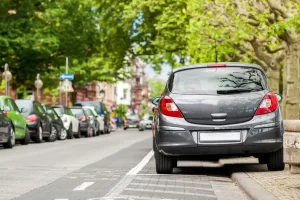Even Crazy Gas Prices Can't Convince Americans to Buy EVs, Says New Survey

A row of EV chargers goes mostly unused in Pasadena, California.Photo: Mario Tama (Getty Images)
Electric cars are making progress in the U.S., but it’s been slow going. Despite American automakers like Ford, General Motors and Jeep all having an EV (or at least a plug-in hybrid) they can point to, Americans simply aren’t buying a ton of EVs. There are three main reasons, and you can probably guess them: high price, low range and lack of charging infrastructure.
Electric cars are still too expensive, still too short on range and — even with the latest EV push in the U.S. — there are still not enough places to charge them, according to a survey released today by Autolist, whose Annual Electric Survey has been going on since 2019.
This year, Autolist spoke to more than 1,300 American car buyers to take their temperature on EVs. The survey results confirm what you may have already suspected or observed on your commute. It’s obvious that the overwhelming majority of drivers in America are still choosing internal-combustion cars over EVs in 2022, but the reasons have changed since Autolist’s survey began. These are the biggest hurdles to EV ownership, according to the American car buyers surveyed:
Graphic: Autolist
The high price of EVs, previously the number-two concern for American buyers, is now the most significant hurdle; nearly half of respondents said EVs are too expensive to buy or lease. Range anxiety is becoming less of a thing for Americans, slipping to second place, though 44 percent of respondents still cite it as their top concern. And 36 percent of respondents cited the lack of infrastructure (meaning availability of chargers), rounding out the top three.
While I hate be the bearer of bad news, EVs are not going to get cheaper any time soon. Raw materials are becoming more expensive, driving up the cost of production for EV makers and, in turn, increasing EV prices across the board. So much for production at scale driving down costs as the tech matures.
G/O Media may get a commission
24% Off
Braun Electric Razor for Men
Clean
Has a special flexible head to hit everywhere you need it to, has a variety of different functions to use to fit your preferred style, and is designed to last seven years.
One way to offset these high costs has been through government subsidies and incentives. The survey shows Americans are largely in support of these. Two-third of respondents (66 percent) said federal incentives should help boost EV adoption.
The issue with these subsidies — which can knock as much as $7,500 off an electric car’s price via tax rebates — is that they don’t apply in all cases, tapering off when a carmaker sells over 200,000 electric cars. Tesla, GM and Toyota have all surpassed that number, so if you’re relying on a rebate to make an EV affordable, you can’t get it with any of those automakers.
In a somewhat surprising turn, the high price of gas doesn’t seem to be pushing American drivers toward EVs. When asked what gas price would get subjects to switch to an EV, the biggest response was “it’s not about gas price.”
Graphic: Autolist
That puts EVs in somewhat of a bind, because a major argument in favor of switching is to save money on gasoline! Of course, there are many reasons to switch besides saving money on gas. Which is to say that internal-combustion cars and electric cars have one thing in common: Buying one is not altogether a rational decision.




